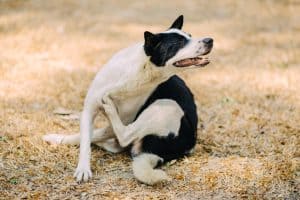Dog dementia – When your best friend is no longer the same
If you’ve noticed that your senior dog is acting strangely, getting lost in the house, or not responding as usual, it might not just be aging – it could be a sign of dog dementia. This condition is similar to Alzheimer’s disease in humans and unfortunately affects more and more aging dogs. The good news is that with conscious care, nutritional supplements, and love, you can do a lot to help your dog continue to enjoy life.
What is dog dementia and why does it develop?
Canine cognitive dysfunction syndrome (CDS) is an age-related condition where nerve cells gradually lose their connections, and blood flow to the brain decreases. This leads to memory loss, confusion, and behavioral changes. It usually appears after the age of 8–10, although in smaller breeds it may develop later.
The most common causes
- Oxidative stress: when free radicals accumulate, they damage brain cells and accelerate the natural aging process, which in turn weakens cognitive functions.
- Reduced blood flow to the brain: as circulation slows, less oxygen and fewer nutrients reach the brain, and this can impair memory and mental alertness.
- Protein plaques: these deposits, similar to those found in Alzheimer’s disease, build up between neurons and interfere with their communication, making it harder for the brain to process information.
- Nutritional deficiencies: when the diet lacks antioxidants, B vitamins, and omega-3 fatty acids, the brain becomes more vulnerable to oxidative stress and inflammation, which further contributes to cognitive decline.
Symptoms of dementia in dogs – signs you shouldn’t ignore

- Disorientation: gets lost in the house, cannot find the door or bed.
- Changed sleep pattern: active at night, sleeps a lot during the day.
- Apathy or excessive attachment: less responsive to the owner, or anxious when left alone.
- Forgetting house rules: starts urinating indoors again.
- Repetitive behaviors: walking in circles, staring blankly, barking without reason.
- Reduced activity: less interest in toys, walks, or other dogs.
How is dog dementia diagnosed?
Diagnosis must always be made by a veterinarian, since many other conditions – such as thyroid disorders or vision problems – can cause similar symptoms. The evaluation usually includes:
- Medical history and behavioral assessment: when symptoms started and how often they occur.
- Laboratory tests: to rule out hormonal or metabolic disorders.
- Neurological tests: to assess the nervous system and reflexes.
Treatment for dog dementia – what can the vet do?
Although dog dementia cannot be cured, several treatment options can help slow the process. The goal is to support brain function and improve the dog’s quality of life.
Medication options
- Selegiline: it increases dopamine levels, which helps improve attention, alertness, and overall mood.
- Propentofylline: this medication stimulates blood flow to the brain, and at the same time it reduces lethargy and boosts mental activity.
- Memantine: it can help slow neuron degeneration in more advanced cases, and it may also support cognitive stability over time.
Only a veterinarian can determine the appropriate dog dementia medication and dosage, since every dog responds differently to treatment and has individual needs.
Supplements and diet
A proper diet plays a key role in slowing down dog dementia. Omega-3 fatty acids, vitamins E and C, coenzyme Q10, and phosphatidylserine all support healthy brain function. In addition, certain natural medicinal mushrooms and antioxidants can help protect and regenerate neurons.
- Antioxidants: they protect neurons from oxidative damage, and they also help maintain overall brain health and vitality. (K9 INUKrill®)
- Krill oil: it is rich in omega-3 fatty acids (EPA and DHA), and it also contains astaxanthin, one of the strongest natural antioxidants. Because astaxanthin can cross the blood-brain barrier, it directly protects neurons from oxidative stress and inflammation.
- B vitamins: they support the nervous system and energy metabolism, while also helping maintain healthy brain function.
- Lion’s mane mushroom (Hericium erinaceus): it stimulates nerve growth factor (NGF) production, and it promotes neuron regeneration, which may improve both memory and learning ability.
- Reishi mushroom (Ganoderma lucidum): this powerful antioxidant and anti-inflammatory medicinal mushroom helps reduce oxidative damage in neurons, and it also improves blood circulation.
- Cordyceps: it enhances oxygen supply and cellular energy production in the brain, so it increases vitality and supports healthy cerebral circulation in senior dogs.
These natural compounds can be safely combined and, together with veterinary treatment, may significantly help preserve brain function, stabilize behavior, and slow the progression of canine cognitive dysfunction.
Natural care and home management for dogs with dementia
In addition to medication, optimizing the environment and daily routine can also make a big difference, because consistency helps reduce confusion and anxiety. For a senior dog with dementia, a safe, calm, and predictable environment is absolutely essential.
- Consistent daily routine: keep feeding, walking, and sleeping times fixed, so your dog knows what to expect and feels more secure.
- Mental stimulation: use puzzle toys, teach simple new commands, and include short, positive training sessions to keep your dog’s mind active and engaged.
- Good lighting: ensure the living space is well-lit, especially at night, because proper lighting helps your dog orient themselves and reduces disorientation.
- Resting area: provide a comfortable, quiet space where your dog can rest undisturbed, yet still feel close to the family environment.
How can the owner help? – Patience, love, attention
Caring for a dog with dementia can be challenging, but your presence, calmness, and affection mean everything. Avoid sudden noises, never punish disoriented behavior, and reward your dog for responding to familiar routines. Love, security, and consistency help stabilize their behavior.
Prevention – How to keep your dog’s brain young
Dog dementia cannot always be prevented, but its risk can be reduced:
- Regular exercise: improves blood circulation and oxygen supply to the brain.
- High-quality food: rich in antioxidants, vitamins, and omega-3 fatty acids.
- Mental challenges: learning, new toys, training.
- Veterinary checkups: early detection allows for better management.
Frequently asked questions about dog dementia
❓ How long can a dog live with dementia?
The course of the disease varies, but with proper care and nutrition, dogs can live for several years with good quality of life.
❓ Can dog dementia be reversed?
No, but the progression can be slowed, and symptoms can be alleviated through appropriate treatment, diet, and stimulation.
❓ When should I see a vet?
If your dog seems confused, anxious, has disrupted sleep patterns, or develops new behavioral changes, contact your veterinarian as soon as possible.
Summary
Dog dementia is a serious but not hopeless condition. Early detection, targeted nutrition, mental stimulation, and the owner’s love together can help an aging dog live happily, safely, and with dignity.
You may also like:
If your dog is aging, it’s important to monitor their overall health, not just behavioral changes. For joint protection, the Boswellia serrata extract offers a natural anti-inflammatory solution that can also support mobility and brain circulation. In older dogs, gut flora can become more sensitive, so read our article on how to manage dog diarrhea naturally. If you’re curious about the science behind natural supplements, learn more about the production of medicinal mushrooms.
Many senior dogs also experience sensitive skin and immune issues – so it’s good to know how to manage dog allergies safely. Mobility problems in older dogs are often linked to joint issues such as shoulder dysplasia, which can be managed effectively if detected early. During colder months, pay attention to seasonal hazards – for example, antifreeze poisoning in dogs can be fatal. Finally, if you want to understand what your dog’s tail wagging says about their mood and mental state, check out our detailed guide on that too.
Important:
This article about dog dementia is for informational purposes only and is not a substitute for veterinary diagnosis or treatment. Always consult your veterinarian for an accurate diagnosis and appropriate therapy.
References:
- Neilson, J. C., Hart, B. L., Cliff, K. D., & Ruehl, W. W. (2001). Prevalence of behavioral changes associated with age-related cognitive impairment in dogs. (PDF) Journal of the American Veterinary Medical Association, 218(11), 1787–1791.
- Milgram, N. W., Araujo, J. A., et al. (2002). Dietary enrichment counteracts age-associated cognitive dysfunction in canines. Neurobiology of Aging, 23(5), 737–745.
- Cotman, C. W., Head, E., et al. (2002). Brain aging in the canine: a diet enriched in antioxidants reduces cognitive dysfunction. Neurobiology of Aging, 23(5), 809–818.
- Molina, J. A., et al. (2020). Efficacy of medium-chain triglyceride oil dietary supplementation on canine cognitive dysfunction. Animals, 10(12): 2384.
- Nakatsuka, K., et al. (2023). Efficacy of a commercially available MCT-enriched therapeutic diet in dogs with cognitive dysfunction. Veterinary Sciences, 10(8): 454.
- Campbell, S., et al. (2001). A non-comparative open-label study evaluating the effect of selegiline hydrochloride in 641 dogs with clinical signs of cognitive dysfunction. Applied Animal Behaviour Science, 74(1), 45–64.
- Kim, C. Y., et al. (2024). Advancing the early detection of canine cognitive dysfunction. Frontiers in Veterinary Science, 11:1390296.
- Simon, K. E., Gruen, M. E., & Olby, N. J. (2025). Current practices for diagnosis and management of canine cognitive dysfunction syndrome in the United States. (PDF) Frontiers in Veterinary Science, 12:1685430.
- Chew, B. P., & Park, J. S. (2018). The effects of astaxanthin on cognitive function and neurodegeneration in humans. Nutrients, 10(9):1151.
- Bahbah, E. I., et al. (2021). Molecular mechanisms of astaxanthin as a potential neuroprotective agent. Marine Drugs, 19(3):155.
- Mori, K., et al. (2009). Prevention of Early Alzheimer’s Disease by Erinacine A-Enriched Hericium erinaceus. Frontiers in Aging Neuroscience, 12:557.



